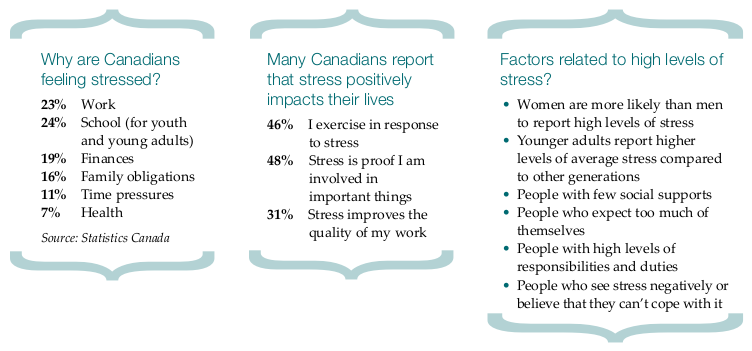|
|
Having trouble coping? Stressed out? Feeling overwhelmed? |
If your answer is YES, you are not alone.
Everyone feels stressed from time to time. Some people, though, say that they feel very stressed most of the time. In fact, 21% of Canadians aged 12 and older rated their life stress as quite a bit or extremely stressful. While stress isn’t always bad and can even be helpful, too much stress can affect your well-being negatively.
What causes stress?
Stress comes up when you feel like the demands of a situation or event are too much to manage. It can come up with everyday situations, such as:
-
Managing demands at work or school
-
Managing relationships
-
Managing finances
-
Dealing with unfair treatment
-
Managing long-term health problems
Stress can also come up in response to a specific event or situation. Both positive and negative life events can be stressful, especially those that involve major changes to your regular routines. Here are some examples:
-
Changes in a relationship
-
Changes in housing arrangements
-
The death of a family member or friend
-
Changes in your job or other source of income
As stress is based on the way you see and react to a situation or event, the events or situations that cause stress are different for different people.
How you feel when issues come up can also affect the way you experience stress. If you feel well and confident in your ability to manage challenges, a problem may not seem very stressful. However, if you already feel stressed or overwhelmed, the same problem may add to your existing stress and feel very overwhelming.
Are you experiencing signs of stress?
Stress can affect your body, your behaviours, your feelings and your thoughts. Here are common signs of stress:
Changes in your body
-
Tense muscles
-
Rapid breathing and heart rate
-
Headaches
-
Difficulties sleeping well
-
Fatigue
-
Changes in sex drive
-
Weaker immune system
Changes in your behaviours
-
Withdrawing from others
-
Fidgeting, feeling restless
-
Smoking, drinking or using more drugs than usual
-
Avoiding situations that you think are stressful
Changes in your feelings
-
Feeling worried or confused
-
Feeling angry or irritable
-
Feeling overwhelmed or helpless
-
Feeling like you can't cope
Changes in your thoughts
-
Struggling to concentrate, remember or make decisions
-
Losing your self-confidence
-
Having a negative attitude towards yourself and your life

Why does stress make me feel so awful?
Your body is designed to react to stress in ways that protect you from threats, such as predators. Although facing life-threatening predators is not common today, you do have many daily demands, such as paying bills, working, and taking care of family. Your body treats these demands as threats and the fight-flight-freeze response is activated in your body. At times, stress can have a negative effect on the basic dimensions of mental health (your thoughts, emotions, behaviours and body reactions). Stress may affect your health if you use unhealthy behaviours to cope. The negative effects of stress on your wellness can become a source of stress in and of themselves. Just talk to anyone who isn’t sleeping well due to stress! For more information about the dimensions of mental health that can be influenced by stress, see Wellness Module 1: Mental Health Matters at www.heretohelp.bc.ca.
Can stress be a good thing?
Sometimes, stress can have a positive effect on your thoughts, emotions, behaviours and body reactions. Stress is more likely to result in positive outcomes if you see it as a challenge or something you can strive to overcome. It can help motivate you to work hard. Stress can also lead to positive effects if you respond with healthy behaviours that improve your situation. You can experience the positive effects of stress even in the face of some negative effects.
Stress and illness
Your stress levels and your coping skills can also influence your physical health. Higher levels of stress can increase the risk of illness and disease. For example, you're more likely to catch a cold or the flu when you're coping with high levels of stress. There is also evidence that stress can aggravate disorders such as rheumatoid arthritis, insulin-dependent diabetes, multiple sclerosis and more. Chronic stress also has a negative impact on your physical health. Some of the connections between stress and illness are determined by the ways you cope with stress.
Coping with stress
There is no right or wrong way to cope with stress. What works for one person may not work for another, and what works in one situation may not work in another situation. Below, you will find common ways to cope with stress and maintain wellness.
Focus on what you can doThere is usually something you can do to manage stress in most situations. |
|
Manage your emotionsFeelings of sadness, anger or fear are common when coping with stress. |
|
Seek out supportSeeking social support from other people is helpful—especially when you feel you can't cope on your own. Family, friends, co-workers and health professionals can all be important sources of support. |
|
Focus on helpful and realistic thoughtsThis is one of the hardest things to do when coping with stress. At times, it can seem impossible. But, dwelling on the negatives often adds to your stress and takes away your motivation to make things better. |
|
Make a plan of actionProblem-solving around aspects of a situation that you can control is one of the most effective ways to lower your stress. Try breaking a stressful problem into manageable chunks. Think about the best way to approach the problem. You may decide to put other tasks on hold to concentrate on the main problem, or you may decide to wait for the right time and place to act. |
See our Wellness Module on problem-solving at www.heretohelp.bc.ca |
Self-careTaking good care of yourself can be difficult during stressful times, but self-care can help you cope with problems more effectively. The trick to self-care is to look for little things you can do everyday to help yourself feel well. Here are some self-care activities to try. Try to think of other activities that might help! |
|
Take care of your relationshipsFamily, friends and co-workers can be affected by your stress—and they can also be part of the problem. Be assertive about your needs rather than aggressive or passive. Being assertive means expressing your needs in a respectful way, which allows you to keep your feelings and needs, as well as the feelings and needs of others, in mind. |
|
SpiritualitySpirituality takes many forms and means different things to different people. It can vary from culture to culture, with religion being one way that people experience or express spirituality. People who engage in a spiritual practice often experience lower levels of distress. If community is part of a spiritual practice, it may also offer helpful social support. |
|
AcceptanceThere may be times when you can't change something. This can be the most challenging aspect of coping with stress. Acceptance means allowing unpleasant feelings and sensations to surface and come and go without trying to resist or fight them. It allows people to recognize and come to terms with what is out of their control while focusing on the actions they can take to improve their lives. Sometimes, all you can do is manage your distress or grief. |
|
DistractionDistraction can be helpful when coping with short-term stress you can't control, such as reading a magazine while getting dental work done. Distraction strategies can help you to tolerate distress until it is a more appropriate time to resolve the issue. Distraction can be harmful if it stops you from taking action on things you can control, such as watching TV when you have school or work deadlines to meet. Distraction by using drugs, alcohol or over-eating often leads to more stress and problems in the long term. Distraction by overworking at school or on the job can easily lead to burnout or other problems, like family resentment. |
You can do many things to take your mind off problems, such as:
When used for short periods of time, many of these forms of distraction create opportunities to take a break and refuel—an important part of self-care. |
If you feel like you can't cope, try these options
-
Talk to someone that cares about you. They may be able to provide help and support.
-
Seek professional help as early as possible. Prevention strategies can strengthen protective factors and improve mental health. Talk to your family doctor or mental health care provider, or visit a drop-in clinic or the hospital emergency room.
Try these helpful numbers
- Crisis Line: Call 310-6789 (no area code) to connect to a crisis line in BC
- Kids' Help Phone: Call 1-800-668-6868 (free call anywhere in Canada)
Stress survey: What types of stress are you coping with?
Problem solving the controllable aspects of a stressful situation is one of the most effective ways to lower our stress. Identifying the problem and breaking it down into manageable chunks is the first step in creating a plan of action.
You can use this survey to help identify the different sources of stress in your life, and to track your progress in coping with them in a healthy way. Check the boxes beside the sentences you feel apply to you, then brainstorm strategies for coping with or solving each problem. See the Coping with Stress section of this wellness module for more information and tips on how to ensure your coping choices lead to reductions in stress and a healthier, more fulfilling life for you and your loved ones. Try taking the survey once a month to track patterns in your behaviour—and the positive and negative ways you manage stress.
Adapted from: Holmes and Rahe, 1967; Wheaton, 1997.
About the authors

Canadian Mental Health Association BC Division helps people access the community resources they need to maintain and improve mental health, build resilience, and support recovery from mental illness. CMHA BC has served BC for over 60 years.

Anxiety Canada promotes awareness of anxiety disorders and increases access to proven resources. Visit www.anxietycanada.com.
Select sources and additional resources:
- Understand Freeze, Fight, Flight—your body's response to threats at anxietycanada.com/learn-about-anxiety/anxiety-in-youth/
- Find the Stress info sheet from HeretoHelp at www.heretohelp.bc.ca/infosheet/stress
- Download the MindShift CBT App and use Chill-Out Tools at anxietycanada.com/resources/mindshift-cbt/
- Michel, F. (2008). Assert Yourself. Perth, Western Australia: Centre for Clinical Interventions. Retreived from www.cci.health.wa.gov.au/Resources/Looking-After-Yourself/Assertiveness
- Maté, G. (2004). When the Body Says No: The Cost of Hidden Stress. Toronto: Vintage Canada.
- Paterson, R. J. (2000). The Assertiveness Workbook: How to Express Your Ideas and Stand Up for Yourself at Work and in Relationships. Oakland, CA: New Harbinger Publications.
- Statistics Canada. (2019). Table 13-10-0802-01 Mental health characteristics: Ability to handle stress and sources of stress. www150.statcan.gc.ca/t1/tbl1/en/cv.action?pid=1310080201
- Statistics Canada. (2019). Table 13-10-0096-04 Perceived life stress, by age group. Retrieved from www150.statcan.gc.ca/t1/tbl1/en/tv.action?pid=1310009604
- Mental Health Foundation. (2008). Executive briefing: Spirituality and mental health. Retrieved from www.mentalhealth.org.uk/publications/spirituality-and-mental-health-briefing
- American Psychological Association. (2010). Gender and stress. Retreived from www.apa.org/news/press/releases/stress/2010/gender-stress
- American Psychological Association. (2012). Stress by generation. Retreived from www.apa.org/news/press/releases/stress/2012/generations

